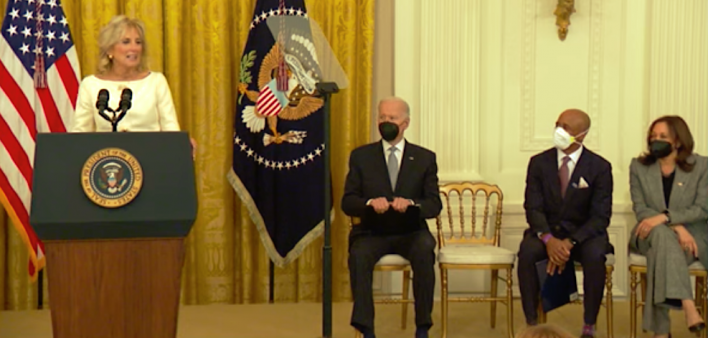President Biden today accelerated the federal Cancer Moonshot program he launched in 2016 while serving as vice president in the Obama administration. “Today, I’m here to announce our plan to supercharge the Cancer Moonshot as a central effort of the Biden-Harris administration,” he said during a special White House event for the cancer program (watch a video of the event above).
The main goals of the program, Biden said, are “to cut the cancer death rate in half in the next 25 years—at least by 50%—to turn more cancers from death sentences into chronic diseases people can live with and to create a more supportive experience for patients and their families. By doing these things, and more, we can end cancer as we know it.”
Thanks to what we have learned in the past five years and prior decades about therapeutics, diagnostics, and patient-driven care – as well as scientific gains and public health lessons of the COVID-19 pandemic – our administration is announcing new goals of the Cancer Moonshot. pic.twitter.com/m0SNPejVc8
— The White House (@WhiteHouse) February 2, 2022
Cancer prevention and screenings also remain a high focus of the initiative, and, in a direct call to action, Biden urged people who missed their screenings due to the COVID-19 pandemic to schedule appointments with their doctors.
“It’s bold, it’s ambitious, but it’s completely doable,” Biden said of the accelerated Cancer Moonshot. “Just as we harnessed the science and developed cutting-edge COVID-19 vaccine and treatments, we’ll bring a fierce sense of urgency to the fight again cancer. My message today is: We can do this. We can end cancer as we know it. This is a presidential White House priority. Period.”
First Lady Jill Biden spoke first at the White House event, recalling a time when several of her friends were diagnosed with breast cancer within a year. The Bidens lost their son Beau to brain cancer in 2015 when he was 46. The doctor who treated Beau was in the White House audience.
Vice President Kamala Harris also spoke about a personal cancer loss: her mother, a breast cancer researcher, died of colon cancer in 2009. “I miss my mother every day,“ Harris said. ”And I carry her memory with me wherever I go. When President Biden launched his Cancer Moonshot five years ago, I, of course, thought of my mother.”
President Biden acknowledged cancer disparities by race, ethnicity, ZIP code and sexuality as well as the research and logistical challenges that lie ahead. Notably, he didn’t mention whether the Cancer Moonshot program would have new financing.
When the program was initially launched, Congress funded it with $1.8 billion over seven years (about $400 million remains for 2022 and 2023). Biden wants Congress to fund the Cancer Moonshot by creating the Advanced Research Projects Agency for Health (ARPA-H), according to CNN. It will be a new program focused on health issues like cancer and Alzheimer’s.
A White House statement, “Fact Sheet: President Biden Reignites Cancer Moonshot to End Cancer As We Know It,” lays out several other goals of the program, including the following administrative and leadership objectives:
- Diagnose cancer sooner
- Prevent cancer
- Address inequities
- Target the right treatments to the right patients
- Speed progress against the most deadly and rare cancers, including childhood cancers
- Support patients, caregivers and survivors
- Learn from all patients
- Reestablish White House leadership
- Form a cancer cabinet
- Issue a call to action on cancer screening and early detection
- Host a White House Cancer Moonshot Summit
- Build on a White House Cancer Roundtable Conversation Series
- Require an all-hands-on-deck approach.
In conjunction with the Cancer Moonshot acceleration, the president’s cancer panel also released “Closing Gaps in Cancer Screening: Connecting People, Communities, and Systems to Improve Equity and Access.”
.@POTUS is calling on the private sector, foundations, academic institutions, healthcare providers, and all Americans to join our whole-of-government mission to reduce the deadly impact of cancer and improve patient experiences.
— The White House (@WhiteHouse) February 2, 2022
Join the Cancer Moonshot: https://t.co/Ar7cwrJyCq
“The reignited Cancer Moonshot will provide an important framework to help improve cancer prevention strategies, increase cancer screenings and early detection, reduce cancer disparities, and propel new lifesaving cures for patients with cancer,” said Margaret Foti, PhD, MD, the CEO of American Association for Cancer Research, in a prepared statement.
“However, if we are to achieve the goals that the President outlined for us today, it is going to require that the President work with Congress to finalize the fiscal year (FY) 2022 appropriations process with robust funding increases for NIH and NCI, as well as announce significant investments in cancer research as part of his FY2023 budget request.”
In related news from Cancer Health, see “The Cancer Moonshot: A Midpoint Progress Update” from January 2021 and “Cancer Moonshot Workshop Highlights Research Advances.”







Comments
Comments